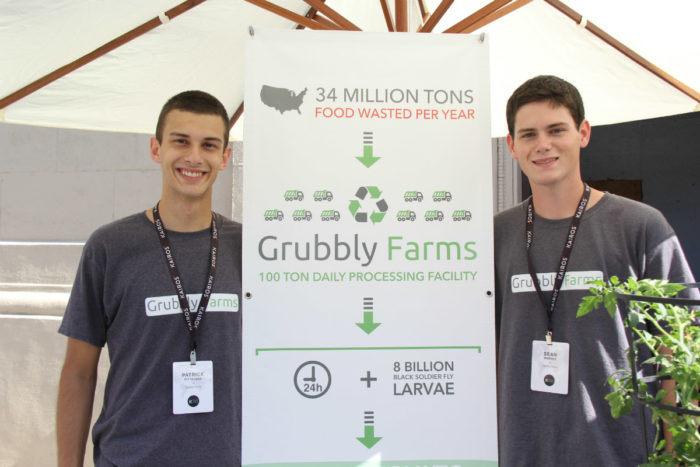The Ray C. Anderson Center for Sustainable Business (the “Center”) focuses on two primary pillars of activity that link education, academic research, and corporate partnership:
- Integrating sustainability into business education and practice
- Inspiring sustainability-driven innovation that drives the “bottom-line” through solutions, products, and services that address key societal issues and challenges
For more on the Center’s pillars and objectives, see our Strategic Plan.
Grubbly Farms, founded by two Georgia Tech alumni and a GT Create-X 2015 startup, exemplifies both of these pillars but especially draws on principles of sustainability-driven business innovation. The company, created by Patrick Pittaluga ’14 and Sean Warner ’15, pursues its vision of a closed-loop agricultural system that reduces food waste sent to landfill, lowers carbon emissions, and eases pressure on overfishing while delivering on protein needs for livestock.
To accomplish this goal, Grubbly Farms produces high-quality chicken feed (called “Grubblies”) using dried larvae of black soldier flies rather than the more common but less sustainable protein choice of fish. What’s more, Grubbly feeds their insect larvae pre-consumer food waste, which otherwise would enter landfills and decompose into methane—a potent greenhouse gas.
In addition to these environmental benefits, this agricultural system also has potential commercial advantages over existing alternatives that rely on fish protein sources. Pittaluga, the Chief Operating Officer of Grubbly Farms, explains: “We wanted to produce a sustainable source of animal feed to replace fish meal, which is made from forage fish at the bottom of the food chain, like sardines and herring. These fish aren’t able to repopulate quickly enough, [which also] has repercussions throughout the food chain, such as on the [food supplies of] larger fish like tuna.” The depletion of forage fish drives this segment’s prices up (some 250 percent over the past 10 years, according to Pittaluga).
Pittagula, along with CEO Warner, required understanding neighbors to get their business model up and running. They bought black solider fly larvae on Amazon and began breeding them in their laundry room at their apartment. “Breeding these flies is one of the more challenging things to do,” Pittagula said. “They require specific lighting, temperature, and humidity to trigger their mating reflexes.”
Luckily, Pittagula and Warner got the flies to mate, lay eggs, and continuously create a new population. Since this success alone was not enough to scale their business, they partnered with Kennesaw State University to use a much larger space at the school’s farm in Acworth. “That was beneficial for us because we were able to use food waste from the university to feed the flies,” said Pittagula. The university benefited, too: “The farm’s chickens ate the Grubblies, and the farm used the larvae excrement for fertilizer.”
Now, Grubbly Farms has teamed up with two locally-based companies—Arden’s Garden and Atlanta Bread—to use those restaurants’ waste for feeding their larvae.
This rising company has attracted attention across the globe—from being highlighted in the pages of The Guardian to being included in the Forbes 30 Under 30 in Manufacturing & Industry list this year.
Pittagula and Warner now want to grow their business by sharing their social mission of recycling food waste and reducing reliance on fishing, and this is where their engagement of Scheller College students comes into play.
“Most people love our product, but they don’t know about our social mission,” said Pittagula. “Once they do, we can create a deeper bond with them, which results in greater customer loyalty.”
During Spring 2017, students from our Center-led sustainability practicum helped Grubbly Farms develop a marketing strategy for one of the key customer segments. Nicole Kawahata and Carolyn Nelson (two of the undergraduates helping Grubbly Farms refine their message) said, “We’ve found that customers care about nutrition first, so we’re recommending that they promote this as their primary message, while pushing the sustainability of their manufacturing process right behind that.”
The course instructor and the Center’s Managing Director, Michael Oxman, summed up the class experience as “a terrific example of collaboration between our Center, students, alumni, and local business that demonstrates how sustainability can be an engine for innovating new products and services.”
Grubbly’s product largely serves owners of pet chickens, but the company has plans to expand sales to commercial chicken farmers. Eventually, they would also like to produce Grubblies pet food for dogs, cats, and fish. The company’s agricultural model has strong commercial potential while facilitating innovative solutions to our collective sustainability challenges. To learn more about Grubbly Farms, you can visit their website here.
Georgia Tech’s Ray C. Anderson Center for Sustainable Business launched in 2013 thanks to the generosity of the Ray C. Anderson Foundation and the Kendeda Fund. The Center was created as a catalyst, connector, and enabler, bringing together students, research faculty, companies, entrepreneurs, and other organizations in environments where business-driven solutions can take shape and thrive.
